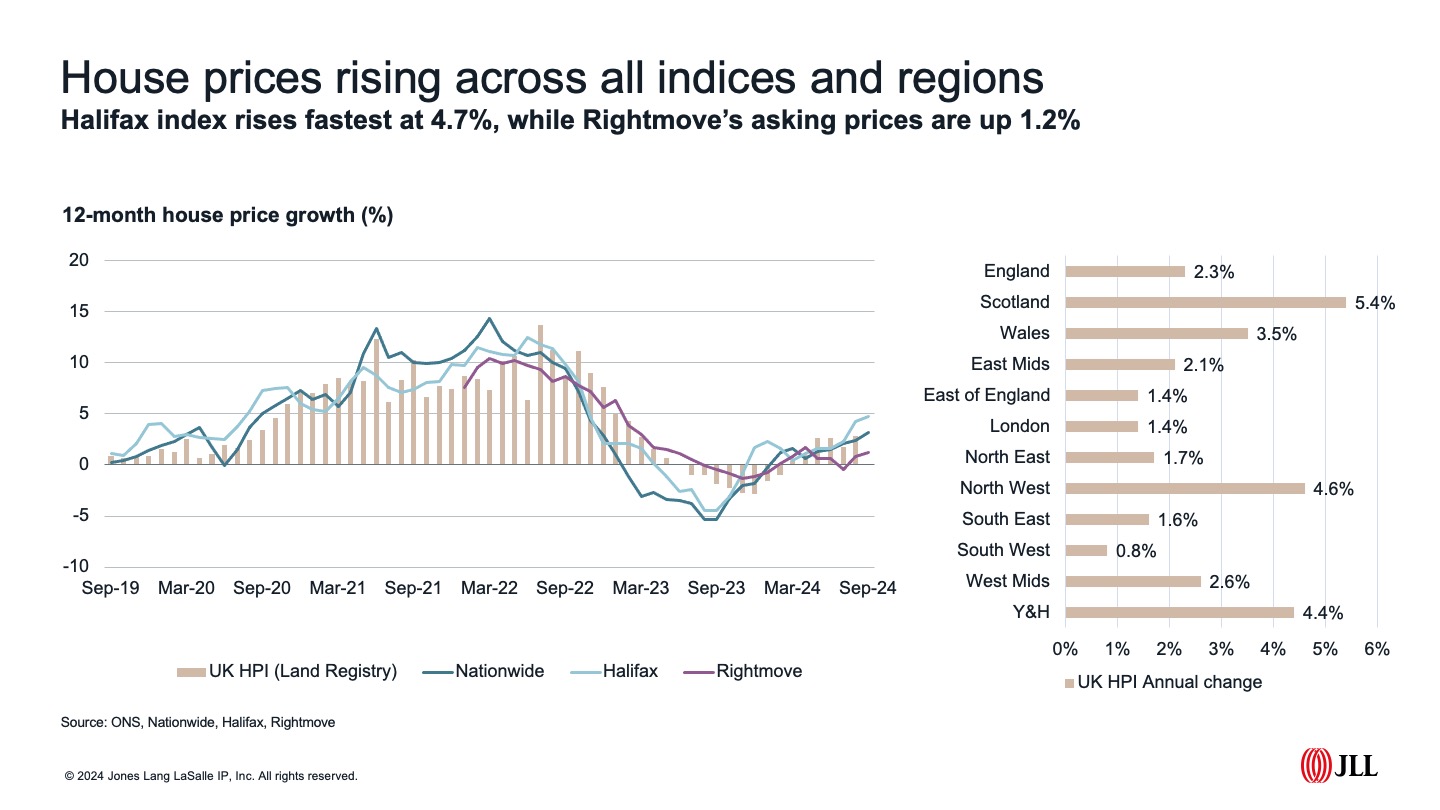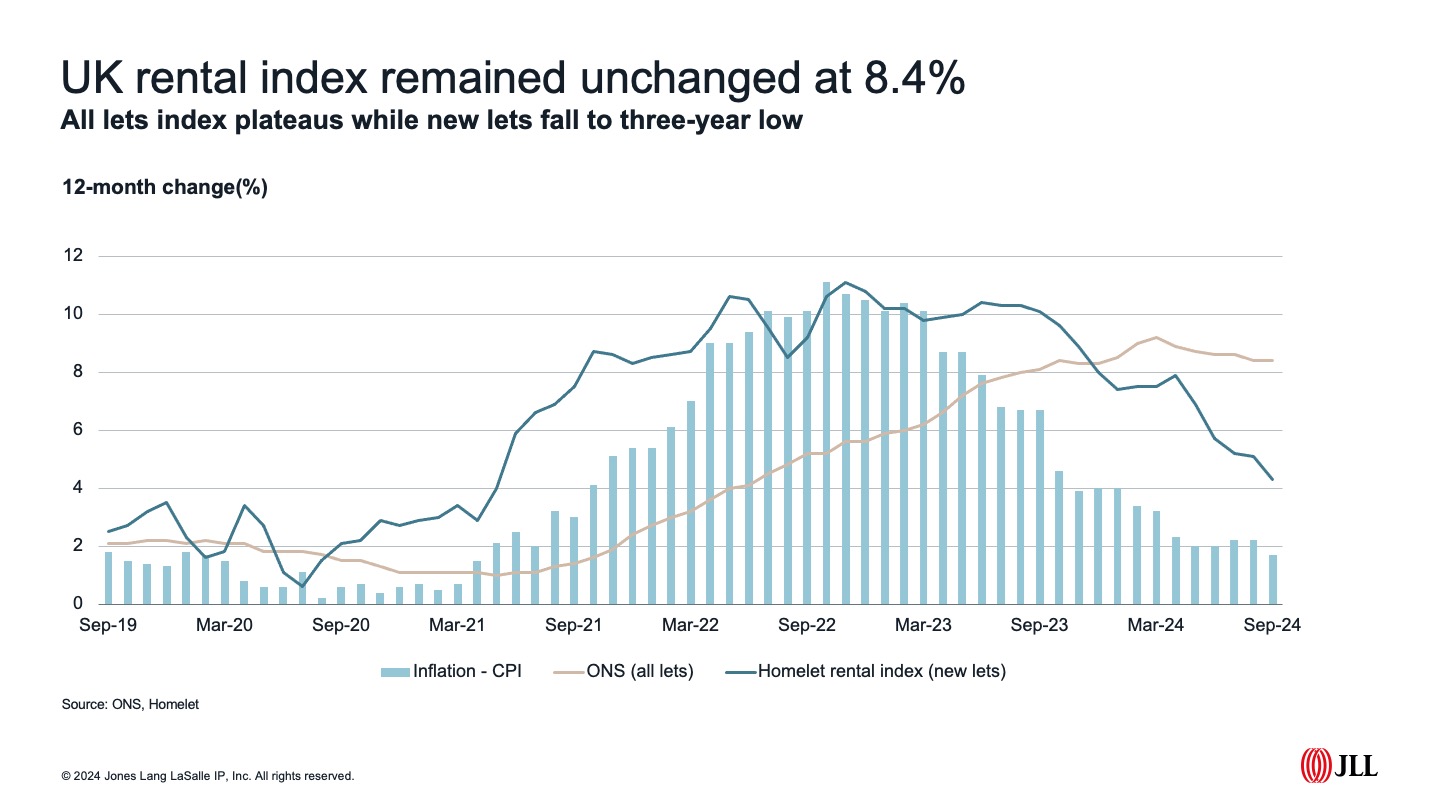This week has brought some welcome news for Andrew Bailey and the Bank of England. Consumer Price Inflation (CPI) fell below 2% for the first time since April 2021, with the annual inflation rate coming in below both the target rate and the Bank’s expectations of 1.9%, rising 1.7% in the year to September. A fall in the cost of airfares and petrol in the last couple of months were credited with these figures coming in lower than forecast.
Core CPI (which excludes things like energy and food) has been more stubborn than overall CPI, but it also fell back further than expected, with annual growth of 3.2% – below the 3.4% forecast – in September.
Wage growth in the three months to August 2024 was broadly in line with the Bank’s expectations. Regular pay rose 4.9% annually, while pay with bonuses was up 3.8%. This combination means real wages (wages after inflation) are rising, meaning more in the pocket for UK workers. Potential Budget tax raids aside, this means we’d expect consumers will be more confident to spend this quarter than last.
This all points to a further reduction in rates when the Monetary Policy Committee meets on 17th November. A 25bp cut remains more likely than 50, but it does open up the prospect of a further 25bps in December, if key indictors keep heading in the right direction.
Mortgage markets
So, all this means mortgage rates are falling, right? Well not quite. Natwest and Santander are just two of the lenders who have announced an increase in their fixed rates in the past few days. This isn’t unusual: often those with the most competitive rates will put them up once they reach certain quotas, but there is a bit more at play here other than just a run on lower rate deals.
Long-term borrowing costs have been rising, with 10-year UK gilt yields (basically a government IOU to be paid back at a future date) rising from a low of 3.75% in mid-September to a mid-October high north of 4.2%. Pre-Budget wobbles are being cited, fuelled by reports that Chancellor Rachel Reeves is looking at relaxing fiscal rules to increase borrowing to fund Budget commitments. In recent days the 10-year rate has dropped a little to below 4.1% but expect uncertainty in the mortgage markets to persist until we know more on the 30th.
House prices
Figures from the Office for National Statistics show August was the sixth consecutive month when house prices posted an annual increase, the latest figures showing prices up 2.8%. This follows announcements from Nationwide and Halifax earlier this month, which showed prices up 3.2% and 4.7% respectively in the year to September. Prices in Scotland (5.4%) and Wales (3.5%) rose more than England (2.3%), with the North West recording the highest growth of any English region at 4.6%. The Midlands and North of England saw higher growth than the South, with the South West the lowest at 0.8%, while London saw growth of 1.4%.
Rental Market
The ONS index of all rents showed an annual increase of 8.4% in September 2024, unchanged from August and down from a peak of 9.2% in March 2024. But the Homelet Rental Index of new lets fell relatively sharply to 4.3% from 5.1% a month before, continuing the trend we've seen this year of renewals commanding higher growth than new lets. In London the ONS all rents index is still showing annual growth of 9.8%, whereas Homelet shows rents for new lets rising just 1.0% annually. Our Q3 JLL lettings data for London sits somewhere in the middle, with average rents achieved on new lets up 2.0% and new lets and renewals combined rising 2.6%.
Construction
The S&P Construction Purchasing Managers Index (PMI) is a good bell weather for activity. The latest release signalled the steepest rate of growth in construction activity in 29 months, driven particularly by civil engineering and commercial developments. But housebuilding has fallen behind, with the volume of new housing activity continuing to fall on an annual basis, according to the ONS. The good news is that compared to 2022/23, housebuilding construction cost inflation is low, but not as low as CPI, which alongside Budget uncertainty is still holding back activity and challenging viability within the sector.
The Budget
The two-week countdown has begun, with ministers remaining relatively tight lipped around what will make the cut on the 30th October. Rachel Reeves appears to be looking closely at employers’ National Insurance Contributions, with the number of ministers explaining how this doesn’t contradict their manifesto pledges suggesting it could be more than just a Westminster rumour. Reports in the Times on Friday 18th October suggest the Chancellor won’t increase Capital Gains Tax (CGT) rates for residential property, with modest increases in CGT on the sale of shares more likely (remember profits from residential property for higher rate tax payers already attract a higher 24% rate compared with 20% for shares). It is often said that a week is a long time in politics, meaning a fortnight must be an age, so we’ll stop speculating for now. Keep an eye out for our next Roundup, a Budget special, out at the end of the month once we know more.






